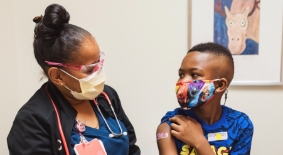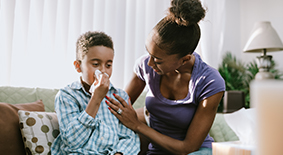The Truth About Your Child’s Vaccinations
Our pediatric specialists partner with you to keep your kids safe and well. One of the best ways that we can do this is with vaccinations. Vaccines are the best and safest way to protect everyone from many illnesses.
If everyone continues to protect themselves through vaccination, diseases that are preventable by vaccination will be rare. However, when people do not get vaccinated, viruses and bacteria that cause these preventable infections circulate in our communities, resulting in outbreaks of infections.
Immunizations Help Prevent Serious Illness in Children
“Diseases like polio and measles, which are becoming more frequent in the U.S., are causing illness as they infect unvaccinated and nonimmune people. And with some diseases, all it takes is one case to cause an outbreak in a community,” said Andi Shane, MD, MPH, System Medical Director, Infectious Diseases. “Immunizations both keep your child from becoming ill and prevent them from spreading a vaccine-preventable bacteria or virus to others.” The measles virus is one of the most contagious viruses and spreads quickly among people who are not immune. The best way to protect children from experiencing a serious infection is to receive recommended vaccinations when they are available.
Questions parents are asking about vaccinations:
Are vaccines safe?
Yes. Vaccines are some of the safest and most effective medications we have.
In the U.S., all vaccines are tested before being recommended for use by the U.S. Food and Drug Administration (FDA) and the Centers for Disease Control and Prevention (CDC). Most vaccines contain a dead or weakened form of the disease-causing virus or bacteria. Vaccines are designed to make the immune system think that it has been exposed to a bacteria or virus, so that the body creates antibodies. Antibodies protect the vaccinated person when they are exposed to someone with that bacteria or virus. There is a greater risk of having complications from a natural infection than from vaccination.
Should I delay or space out vaccines?
No. It’s important to talk to your child’s doctor about your child’s immunization schedule. Changing the vaccine schedule means delaying protection and may mean that your child will need more shots. Many vaccines, like COVID and flu vaccines, can be given at the same time as each other and with other vaccines.
Will giving babies multiple vaccines at one time overload their immune system?
No. Many studies have been done to evaluate the safety of giving a child multiple vaccines. A child’s immune system is exposed to many more antigens (substances that cause your body to have an immune response and create antibodies) in everyday life than what they will receive from vaccines on their immunization schedule.
Do vaccines cause autism spectrum disorder?
No. Many scientific studies have continued to show that vaccines do not cause Autism Spectrum Disorder.
Can vaccines cause infertility?
No. Vaccines are not associated with fertility problems in women or men.
If I get a vaccine while pregnant, does my baby still need to be vaccinated?
Like other vaccinations given during pregnancy, the COVID-19 and flu vaccines protect you and your baby for their first few months of life until they can be vaccinated. Getting a vaccine while pregnant builds antibodies that can be passed to your baby, but this protection fades during their first few months of life. Vaccinating your baby when they are age-eligible is critical to maintain their protection.
Where should I get facts about vaccine safety?
Your child’s pediatrician is your first source of reliable information. They are required to make sure that you understand the benefits and risks of each immunization before your child is vaccinated. Asking questions can help you make a well-informed decision. Additional sources of information include the American Academy of Pediatrics and CDC Vaccine Resources.

What vaccinations does my child need?
Your child will receive most of their childhood vaccines by the time they are 6 years old. Many vaccines are given more than once, at different ages and in different combinations.
You can also download an easy-to-read immunization schedule and record form from the CDC.
Helping Your Kids Stay Healthy and Safe
Andi L. Shane, MD, MPH, MSc, is Medical Director of Infectious Diseases at Children’s Healthcare of Atlanta. Dr. Shane completed an Epidemic Intelligence Service (EIS) fellowship at the Centers for Disease Control and Prevention (CDC) and a pediatric infectious disease fellowship at the University of California San Francisco. Dr. Shane has broad experience and interests in the field of pediatric infectious diseases and is committed to the care of children with infections with special pathogens in protected care environments working with children’s hospital preparedness teams.
This content is general information and is not specific medical advice. Always consult with a doctor or healthcare provider if you have any questions or concerns about the health of a child. In case of an urgent concern or emergency, call 911 or go to the nearest emergency department right away. Some physicians and affiliated healthcare professionals on the Children’s Healthcare of Atlanta team are independent providers and are not our employees.
Contact Us 404-785-KIDS (5437)



